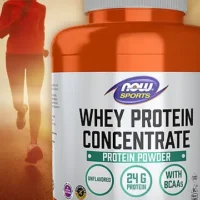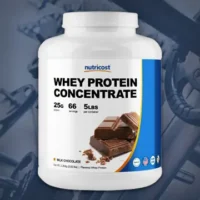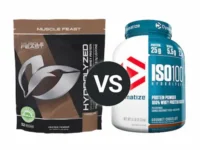Knowledge BaseYou're Questions Answered
BACK
What are the benefits of whey concentrate?
Whey concentrate is a popular form of whey protein that offers a balance of quality protein, essential nutrients, and affordability. It is derived from milk during the cheese-making process and is less processed than whey isolate or hydrolysate, retaining more of the natural nutrients found in whole whey.
Key Benefits of Whey Concentrate
- High-Quality Protein: Whey concentrate is rich in high-quality protein, which is essential for muscle repair, growth, and maintenance. It typically contains about 70-80% protein, which helps support muscle synthesis and aids in recovery after workouts1.
- Cost-Effective: Compared to whey isolate and hydrolysate, whey concentrate is more cost-effective, making it a preferred choice for many individuals looking to supplement their diet without breaking the bank2.
- Nutrient-Rich: Whey concentrate contains more of the natural fats and carbohydrates found in milk, including lactose and various bioactive compounds. This results in a nutrient-rich protein that also provides immune-boosting benefits through components like lactoferrin and immunoglobulins3.
- Satiety: The presence of additional fats and carbohydrates enhances the satiety factor of whey concentrate, making it helpful for weight management by keeping hunger at bay longer than more processed forms of protein4.
Considerations for Whey Concentrate
- Lactose Content: Since it retains more lactose, individuals with lactose intolerance should consider their tolerance levels or opt for whey isolate, which contains less lactose.
- Caloric Content: With more fats and carbohydrates, whey concentrate is slightly higher in calories than whey isolate, which may need to be considered in calorie-restricted diets.
Overall, whey concentrate offers a great combination of protein quality, additional nutrients, and economic value, making it a versatile choice for athletes, bodybuilders, and casual fitness enthusiasts alike.
Was this answer helpful? Let us know!
Like
References:
- Smithers, G. W. (2008). Whey and whey proteins—From ‘gutter-to-gold’. International Dairy Journal, 18(7), 695-704.
- Hulmi, J. J., Lockwood, C. M., & Stout, J. R. (2010). Effect of protein/essential amino acids and resistance training on skeletal muscle hypertrophy: A case for whey protein. Nutrition & Metabolism, 7, 51.
- Hoffman, J. R., & Falvo, M. J. (2004). Protein – Which is Best? Journal of Sports Science and Medicine, 3(3), 118-130.
- Veldhorst, M. A., Nieuwenhuizen, A. G., Hochstenbach-Waelen, A., Westerterp, K. R., Engelen, M. P., Brummer, R. J., ... & Westerterp-Plantenga, M. S. (2009). A breakfast with alpha-lactalbumin, gelatin, or gelatin+TRP lowers energy intake at lunch compared with a breakfast with casein, soy, whey, or whey-GMP. Clinical Nutrition, 28(2), 147-155.
Add to this Answer
Related Questions
Related Reviews

Disclosure
Your Answer
Do you have a suggestion to improve the answer? Please detail your suggestions and provide any references to information that may support your answer if available.
The content on this site has not been written, reviewed or endorsed by a medical professional. We assume no liability for the misuse of supplements and recommend you review the label of any product, as well as consulting with your health care professional.
We are a participant in the Amazon Services LLC Associates Program, an affiliate advertising program designed to provide a means for us to earn fees by linking to Amazon.com and affiliated sites.
We are a participant in the Amazon Services LLC Associates Program, an affiliate advertising program designed to provide a means for us to earn fees by linking to Amazon.com and affiliated sites.
© 2026 ProteinPowder.com






